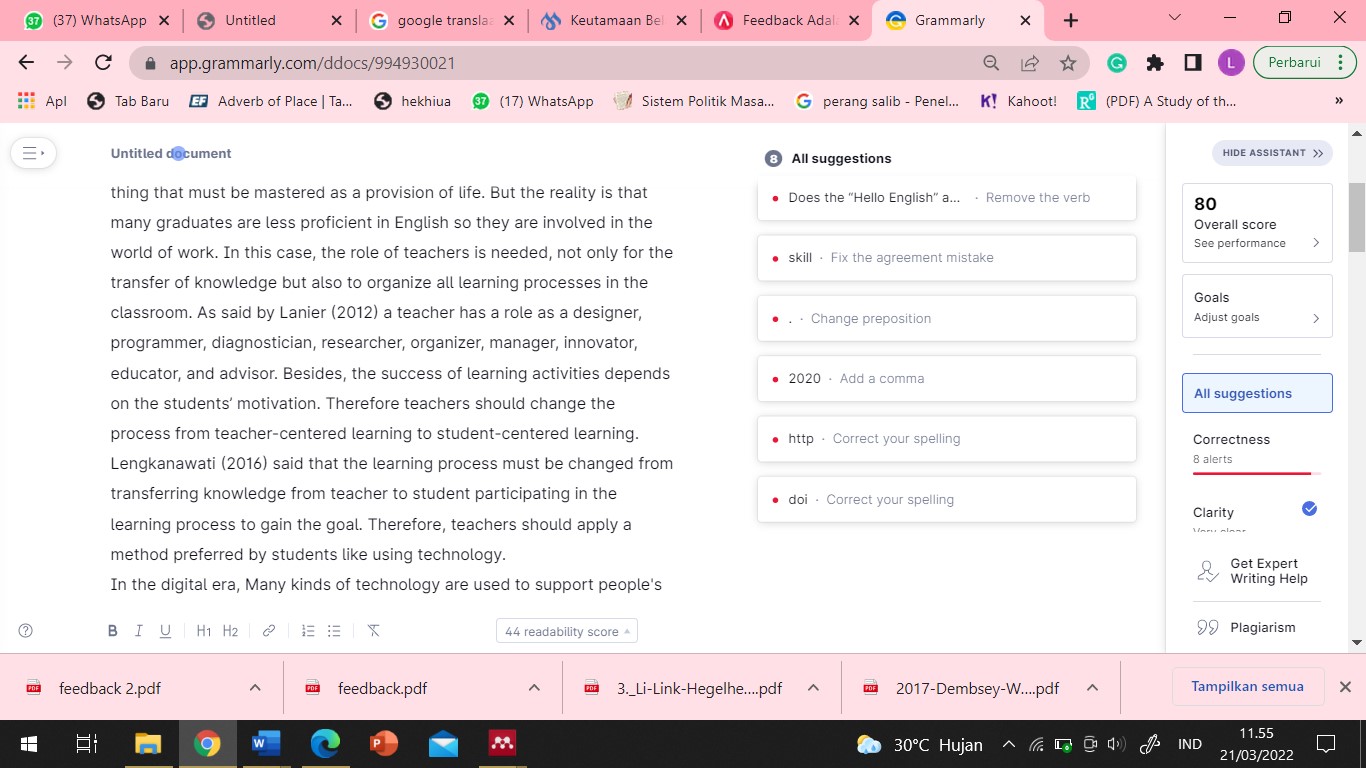EFL students’ perception on Grammarly premium’s feedback and dealing with inaccuracies
DOI:
https://doi.org/10.21070/jees.v7i2.1687Keywords:
Grammarly feedback, Inaccuracy, Perception, EFL studentsAbstract
Grammarly is one of the famous Automated Writing Evaluation (AWE) tools used by EFL students. However, studies evaluating Grammarly’s feedback accuracy, especially the premium version, are still limited. This study aims to: (1) explore EFL students' perceptions of Grammarly premium feedback, (2) provide a detailed analysis of types of inaccurate feedback provided by Grammarly premium, and (3) investigate how students handle inaccurate feedback. This mix method study used a questionnaire, semi-structured interviews, and documentation to collect the data. The participants were undergraduate EFL students who were writing or had completed their thesis. The results indicate that: (1) students have positive and negative perceptions on the use of Grammarly Premium. The ‘correctness’ feature improved spelling, grammar, punctuation, convention, article, and consistency. The ‘clarity’ feature improves readability. The ‘engagement’ feature made writing varied and the ‘delivery’ feature to get the right tone. On the other hand, students complained about the need of a stable internet connection to work properly and require additional proofreading. (2) Inaccurate feedback generally occurred in the features of correctness (convention, spelling, punctuation, article, and consistency), clarity (passive voice and conciseness), and engagement (variety). (3) Students continued to use Grammarly Premium because it helped them self-proofreading. In short, students still preferred to use Grammarly Premium with some concern in accepting the provided feedback.
HIGHLIGHTS:
- Undergraduates students mostly have positive perception toward Grammarly Premium
while using it during thesis writing. - Grammarly Premium provided many useful features like correctness, clarity, convention, and delivery to help undergraduate students in thesis writing.
- Despite its misleading feedback, students still used Grammarly Premium to help enhance their writing and self-proofreading.
Downloads
References
Aidil, T. M. (2019). Exploring Students’ Perception on the Effectiveness of “Grammarly Software” in Academic
Writing. UIN Ar-Raniry Banda Aceh. https://repository.ar-raniry.ac.id/id/eprint/15658/1/T.%20Muhammad%20Aidil%2C%20140203276%2C%20FTK%2C%20PBI%2C%20082167485507.pdf
Ambarwati, E. K. (2021). Indonesian university students’ appropriating Grammarly for formative feedback. ELT in Focus, 4(1), 1–11. https://doi.org/10.35706/eltinfc.v4i1.5216
Ary, D., Jacobs, L. C., & Sorensen, C. K. (2010). Introduction to Research in Education (8th ed.). USA: Wadswoth Cangage Learning. https://www.academia.edu/38674323/Introduction_to_Research_in_Education
Cavaleri, M., & Dianati, S. (2016). You want me to check your grammar again? The usefulness of an online grammar checker as perceived by students. Journal of Academic Language and Learning, 10(1), A223-A236. https://journal.aall.org.au/index.php/jall/article/view/393
Dembsey, J. M. (2017). Closing the Grammarly® Gaps: A Study of Claims and Feedback from an Online Grammar Program. Writing Center Journal, 36(1), 63–100. https://www.jstor.org/stable/44252638
Dodigovic, M. (2021). Automated Writing Evaluation: The Accuracy of Grammarly’s Feedback on Form. International Journal of TESOL Studies, 3(2), 71–87. https://doi.org/10.46451/ijts.2021.06.06
Fahmi, M. A., & Cahyono, B. Y. (2021). EFL students’ perception on the use of Grammarly and teacher feedback. JEES (Journal of English Educators Society), 6(1), 18–25. https://doi.org/10.21070/jees.v6i1.849
Fitria, R. A. (2021). Students’ Perceptions of the Use of Grammarly in Undergraduate Thesis Writing at IAIN Palangka Raya. IAIN Palangkaraya.
Grammarly.inc. (2022). About Us | Grammarly. 2022. https://www.grammarly.com/about
Guo, Q., Feng, R., & Hua, Y. (2021). How effectively can EFL students use automated written corrective feedback (AWCF) in research writing? Computer Assisted Language Learning, 1–20. https://doi.org/10.1080/09588221.2021.1879161
Karyuatry, L. (2018). Grammarly as a Tool to Improve Students’ Writing Quality: Free Online-Proofreader across the Boundaries. JSSH (Jurnal Sains Sosial Dan Humaniora), 2(1), 83-89. https://doi.org/10.30595/jssh.v2i1.2297
Lailika, H. I. (2019). Students’ Peceptions of The Use of Grammarly as an Online Grammar Checker in Thesis Writing. [Universitas Islam Negeri Sunan Ampel Surabaya.]. http://digilib.uinsby.ac.id/34607/
Mozgovoy, M. (2011). Dependency-based rules for grammar checking with Language Tool. Federated Conference on Computer Science and Information Systems, 209-212. http://citeseerx.ist.psu.edu/viewdoc/download?doi=10.1.1.231.5763&rep=rep1&type=pdf
Ni Chang, A., Watson, B., Bakerson, M. a., Williams, E. E., Mcgoron, F. X., & Spitzer, B. (2012). Electronic Feedback or Handwritten Feedback : What Do Undergraduate Students Prefer and Why? Journal of Teaching and Learning with Technology, 1(1), 1–23. http://jotlt.indiana.edu/article/download/2043/1996%5Cnhttp://jotlt.indiana.edu/article/view/2043
Nova, M. (2018). Utilizing Grammarly in Evaluating Academic Writing: a Narrative Research on EFL Students’ Experience. Premise: Journal of English Education, 7(1), 80-96. https://doi.org/10.24127/pj.v7i1.1332
O’Neill, R., & Russell, A. M. T. (2019a). Grammarly: Help or hindrance? Academic learning advisors’ perceptions of an online grammar checker. Journal of Academic Language & Learning, 13(1), A88–A107. https://journal.aall.org.au/index.php/jall/article/view/591
O’Neill, R., & Russell, A. M. T. (2019b). Stop! Grammar time: University students’ perceptions of the automated feedback program Grammarly. Australasian Journal of Educational Technology, 35(1), 42–56. https://doi.org/10.14742/ajet.3795
Perpustakaan Pusat UIN Malang [@uinmaliki_library]. (2021, May 6th). Pelatihan daring Grammarly. Instagram. https://www.instagram.com/p/COcA3rBpVHx/
Pratama, Y. D. (2020). The Investigation of Using Grammarly As Online Grammar Checker in the Process of Writing. English Ideas: Journal of English Language Education, 1(1), 46–54. https://journal.unsika.ac.id/index.php/IDEAS/article/view/4180/2434
Puspitasari, D. (2013). Grammatical errors made by the second semester students in writing II subject in the English education department of Yogyakarta State University in the academic year of 2012/ 2013 [Universitas Negeri Yogyakarta]. https://eprints.uny.ac.id/20520/
Qassemzadeh, A., & Soleimani, H. (2016). The Impact of Feedback Provision by Grammarly Software and Teachers on Learning Passive Structures by Iranian EFL Learners. Theory and Practice in Language Studies, 6(9). https://doi.org/10.17507/tpls.0609.23
Ranalli, J. (2018). Automated written corrective feedback: how well can students make use of it? Computer Assisted Language Learning, 31(7). https://doi.org/10.1080/09588221.2018.1428994
Solfema. (2021). Statistik Pendidikan: Teori dan Praktik dalam Pendidikan Luar Sekolah. Jakarta: Kencana.

Published
How to Cite
Issue
Section
License
Copyright (c) 2022 Lailatul Khoiroh Ummah, Maslihatul Bisriyah

This work is licensed under a Creative Commons Attribution 4.0 International License.







